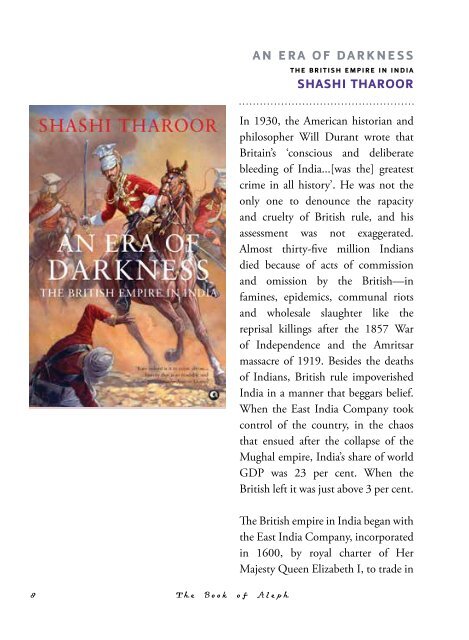The Book of Aleph {Volume 6}
The-Book-of-Aleph-Volume-6
The-Book-of-Aleph-Volume-6
Create successful ePaper yourself
Turn your PDF publications into a flip-book with our unique Google optimized e-Paper software.
an era <strong>of</strong> darkness<br />
the british empire in india<br />
shashi tharoor<br />
In 1930, the American historian and<br />
philosopher Will Durant wrote that<br />
Britain’s ‘conscious and deliberate<br />
bleeding <strong>of</strong> India...[was the] greatest<br />
crime in all history’. He was not the<br />
only one to denounce the rapacity<br />
and cruelty <strong>of</strong> British rule, and his<br />
assessment was not exaggerated.<br />
Almost thirty-five million Indians<br />
died because <strong>of</strong> acts <strong>of</strong> commission<br />
and omission by the British—in<br />
famines, epidemics, communal riots<br />
and wholesale slaughter like the<br />
reprisal killings after the 1857 War<br />
<strong>of</strong> Independence and the Amritsar<br />
massacre <strong>of</strong> 1919. Besides the deaths<br />
<strong>of</strong> Indians, British rule impoverished<br />
India in a manner that beggars belief.<br />
When the East India Company took<br />
control <strong>of</strong> the country, in the chaos<br />
that ensued after the collapse <strong>of</strong> the<br />
Mughal empire, India’s share <strong>of</strong> world<br />
GDP was 23 per cent. When the<br />
British left it was just above 3 per cent.<br />
<strong>The</strong> British empire in India began with<br />
the East India Company, incorporated<br />
in 1600, by royal charter <strong>of</strong> Her<br />
Majesty Queen Elizabeth I, to trade in<br />
silk, spices and other pr<strong>of</strong>itable Indian commodities. Within a century and a half,<br />
the Company had become a power to reckon with in India. In 1757, under the<br />
command <strong>of</strong> Robert Clive, Company forces defeated the ruling Nawab Siraj-ud-<br />
Daula <strong>of</strong> Bengal at Plassey, through a combination <strong>of</strong> superior artillery and even<br />
more superior chicanery. A few years later, the young and weakened Mughal<br />
emperor, Shah Alam II, was browbeaten into issuing an edict that replaced his<br />
own revenue <strong>of</strong>ficials with the Company’s representatives. Over the next several<br />
decades, the East India Company, backed by the British government, extended<br />
its control over most <strong>of</strong> India, ruling with a combination <strong>of</strong> extortion, doubledealing,<br />
and outright corruption backed by violence and superior force. This<br />
state <strong>of</strong> affairs continued until 1857, when large numbers <strong>of</strong> the Company’s<br />
Indian soldiers spearheaded the first major rebellion against colonial rule. After<br />
the rebels were defeated, the British Crown took over power and ruled the<br />
country ostensibly more benignly until 1947, when India won independence.<br />
In this explosive book, bestselling author Shashi Tharoor reveals with acuity,<br />
impeccable research, and trademark wit just how disastrous British rule was<br />
for India. Besides examining the many ways in which the colonizers exploited<br />
India, ranging from the drain <strong>of</strong> national resources to Britain, the destruction<br />
<strong>of</strong> the Indian textile, steel-making, and shipping industries, and the negative<br />
transformation <strong>of</strong> agriculture, he demolishes the arguments <strong>of</strong> Western and<br />
Indian apologists for Empire on the supposed benefits <strong>of</strong> British rule, including<br />
democracy and political freedom, the rule <strong>of</strong> law, and the railways. <strong>The</strong> few<br />
unarguable benefits—the English language, tea, and cricket—were never<br />
actually intended for the benefit <strong>of</strong> the colonized but introduced to serve the<br />
interests <strong>of</strong> the colonizers. Brilliantly narrated and passionately argued, An Era<br />
<strong>of</strong> Darkness will serve to correct many misconceptions about one <strong>of</strong> the most<br />
contested periods <strong>of</strong> Indian history.<br />
For a note about the author, please turn to page 72.<br />
8<br />
<strong>The</strong> <strong>Book</strong> <strong>of</strong> <strong>Aleph</strong> Previously published in 2016<br />
9


